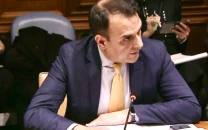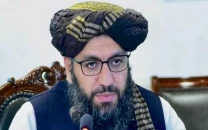Govt to introduce first national tobacco control policy soon
‘Mobile app has been launched to tackle law violations’

PHOTO: FILE
This policy is expected to be finalised within a month.
This was disclosed by the Parliamentary Secretary of National Health Services Regulations and Coordination Dr Nausheen Hamid while speaking during a roundtable meeting on “Understanding Tobacco Control Regime in Pakistan”. The roundtable had been organised by the Sustainable Development Policy Institute (SDPI) in Islamabad on Wednesday.
The roundtable was attended by members of both Senate and National Assembly Standing Committee on Health, whereas officials from Tobacco Control Cell of Health Ministry and members of civil society also participated in the meeting.
Dr Hamid said that as many as three agriculture universities are researching alternative crops to help tobacco growers and farmers move away from this crop.
PTI govt asked to strengthen cigarette tracking system
Talking about the challenges in controlling tobacco growth, she said that the implementation of existing tobacco control laws and weak regulation due to the lack of an effective reporting mechanism were the main reasons.
To tackle this, Dr Hamid said that Prime Minister Imran Khan has recently launched the mobile application “Smoke-Free Pakistan” for reporting violations of tobacco control laws, which will help improve the implementation of laws and regulations.
National Assembly Standing Committee on National Health Services, Regulations and Coordination Chairman Khalid Hussain Magsi stated that his committee fully supports all tobacco control efforts.
He stressed the need for waging a collective fight against the tobacco industry. He said that smokeless tobacco products, such as e-cigarettes and Juul, are more injurious for human health than traditional tobacco products such as cigarettes, adding that there is a need to spread awareness amongst the young generation about its dire consequences.
Senate Standing Committee on National Health Services, Regulations and Coordination Member Ayesha Raza Farooq, on behalf of her committee, also expressed support for tobacco control legislation.
She emphasised the need for greater political will at the top level and urged all stakeholders to refrain for politicizing issues surrounding health.
Waseem Iftikhar Janjua, a senior research associate at SDPI, gave a briefing on the existing tobacco control regime in Pakistan. He highlighted major regulatory challenges in the country and said that Pakistan is a signatory to the Framework Convention on Tobacco Control (FCTC) and had ratified the convention in 2004. Despite that, he said that Pakistan lacks a legal and official definition of tobacco products as per the FCTC guidelines.
Furthermore, lack of adequate laws to ensure smokeless tobacco warnings, advising cessation, unregulated vaping, lack of research on health cost of tobacco, and poor penalties and enforcement mechanism are major regulatory challenges which require urgent attention of the authorities, he added.
Reaction: Growers criticise tax on tobacco
Health Ministry’s Tobacco Control Cell (TCC) Director-General Dr Minhajus Siraj said that to effectively implement existing tobacco control laws and SROs, the tobacco control cell has to fight against corporate giants, who have the audacity to buy or bury any government. He added that the tobacco industry makes its final product more addictive, which is more dangerous for human health.
“When you smoke the tobacco product, it produces 7,000 chemicals and 70 free radicals which can kill a human being,” Dr Siraj said, adding that the TCC is committed to reducing the prevalence of tobacco use in Pakistan by taking administrative, legislative and coordination measures.
The meeting was also attended by MNA Dr Nisar Ahmad Cheema, MNA Dr Shazia Aslam Soomro, MNA Fauzia Behram, Senator Professor Dr Mehr Taj Roghani, MNA Dr Samina Matloob, and MNA Zille Huma.
Published in The Express Tribune, March 12th, 2020.



















COMMENTS
Comments are moderated and generally will be posted if they are on-topic and not abusive.
For more information, please see our Comments FAQ